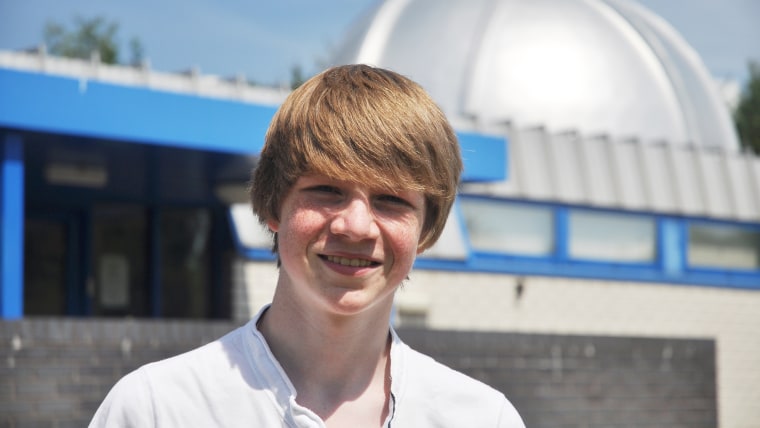Houston, we have a planet!
Tom Wagg has become one of the youngest people to discover a new planet now that after two years of research, scientists have confirmed that Wagg in fact identified a new planet when he was just 15 years old, working as an intern at a research university in the U.K.

Wagg, now 17, was interning with Keele University’s astrophysics department, called WASP (Wide Angle Search for Planets), when he identified what he thought looked like a planet.
“I was looking through thousands of these light curves and I just happened to see one that was really good and I kind of was in disbelief for a moment," Wagg told TODAY.com. "I did all the usual checks and they all kind of confirmed it."
According to Coel Hellier, a professor of astrophysics at Keele and a project leader of WASP South for almost 10 years, there is a lot of work that goes into proving a tiny dip in a star is actually a planet, which is why it's taken two years to confirm Wagg's finding was really a planet.
“You have to do lots of follow-up, observations," Hellier said. "You’ve got to prove that it’s got the right mass to be a planet, the right size to be a planet.”
WASP monitors millions of stars in search of tiny dips in the light of those stars, which indicate that a planet has orbited in front of a star thus blocking out a little part of the light. It's a process that over the last 10 years, astronomists have greatly improved upon, to the point that there now 1,000 known planets orbiting other stars in our galaxy.
Hellier said Wagg’s finding is important to the world of astrophysics, because it helps research institutions such as Keele map out exactly what sort of planetary systems exist in the universe.
“Tom’s planet helps us fill out the picture of what sort of planetary systems there are around stars in our galaxy,” said Hellier.
Researchers say Wagg's planet is a a lot like Jupiter, a large gas giant planet. While it's about the same mass and size as Jupiter and made almost entirely of hydrogen, the main difference is that Jupiter takes 10 years to go around it star (the sun) whereas the planet Wagg found does its orbit in only two days. As a result it will be much hotter than Jupiter.

Hellier says this means Wagg’s planet is much closer to its star, and that a planet of that size and atmosphere so close to a star is unlike anything in our solar system.
Although it could take years for Wagg’s planet to be named (for the time being it's name is WASP-142b), the 17-year-old says if it were up to him he would name his planet “Zeus,” the Greek equivalent of the Roman God “Jupiter,” who the Greeks described to be a bit more temperamental and angry.
Wagg said his plan is to study physics in college. He starts his college application process, and that this experience has also helped him discover more about himself.
“No matter how young you are, you can do and find anything," he said. "It reminds you to work harder, and even though I'm quite young, I can still go on to do something quite good.”
How’s that for making the most out of an internship?